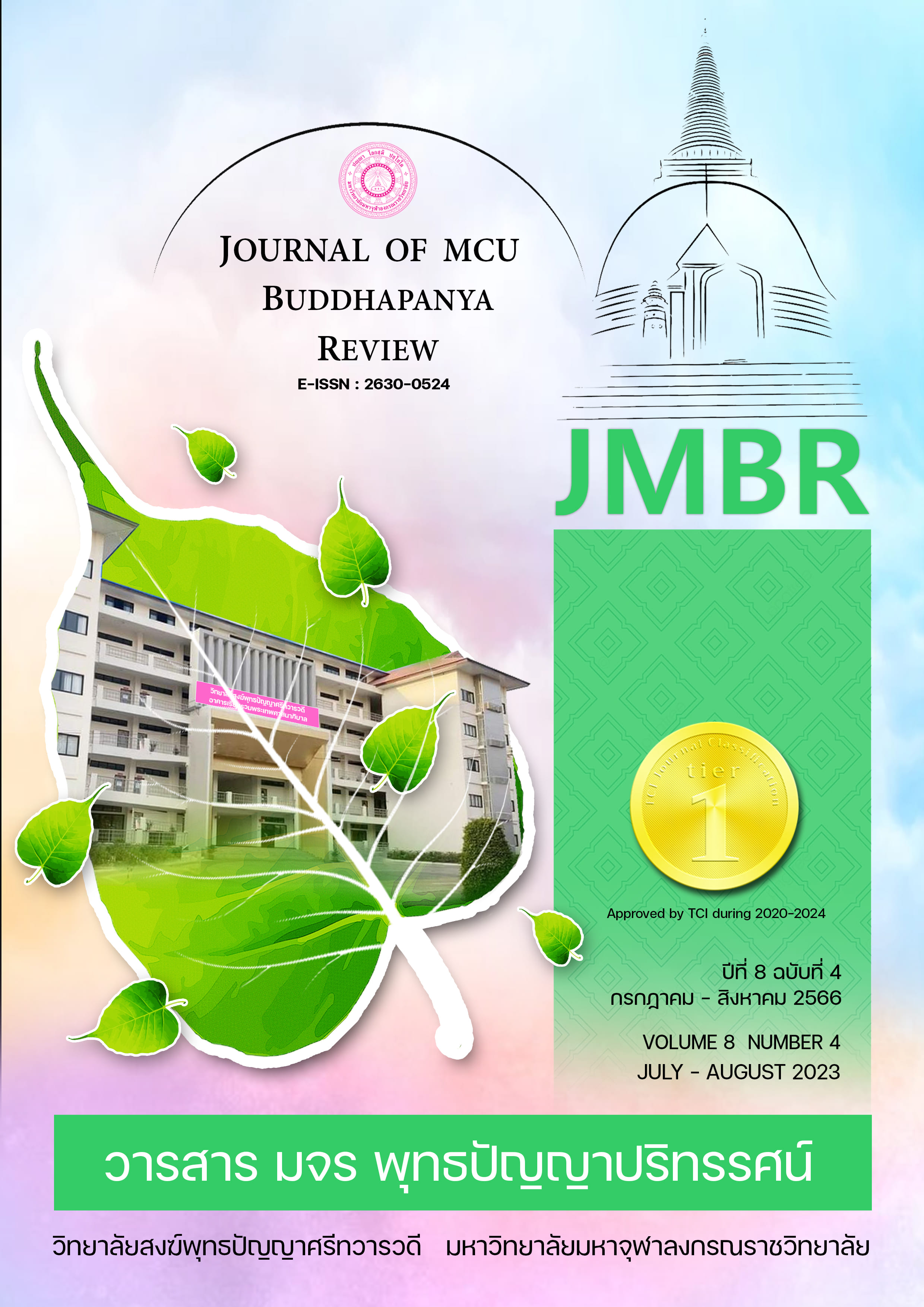การวิเคราะห์ความรู้เชิงบูรณาการด้านเนื้อหาและการสอนของครูในเรื่องเศษส่วน
คำสำคัญ:
ชุมชนการเรียนรู้เชิงวิชาชีพที่ใช้ TLSOA, ความรู้เชิงบูรณาการด้านเนื้อหาและการสอนของครู, เรื่องเศษส่วนบทคัดย่อ
บทความวิจัยนี้มีวัตถุประสงค์เพื่อวิเคราะห์ความรู้เชิงบูรณาการด้านเนื้อหาและการสอนของครูในเรื่องเศษส่วน กลุ่มเป้าหมายประกอบด้วยทีมการศึกษาชั้นเรียน จำนวน 2 ทีม และนักเรียนชั้นประถมศึกษาปีที่ 6 จำนวน 2 โรงเรียน ซึ่งเป็นโรงเรียนที่เข้าร่วมชุมชนการเรียนรู้เชิงวิชาชีพที่ใช้ TLSOA ตามแนวคิดของ Inprasitha (2022) วิเคราะห์ข้อมูลโดยใช้การวิเคราะห์เนื้อหาจากแผนการจัดการเรียนการสอน แนวคิดของนักเรียนจากใบกิจกรรม แบบบันทึกภาคสนาม โพรโทคอลชั้นเรียนและการสะท้อนผล และแบบบันทึกการสัมภาษณ์ ผลการวิจัยพบว่า ในชุมชนการเรียนรู้เชิงวิชาชีพที่ใช้ TLSOA กลุ่มเป้าหมายมีความรู้เชิงบูรณาการด้านเนื้อหาและการสอนในเรื่องเศษส่วน ดังนี้ 1) ทีมการศึกษาชั้นเรียนสามารถสร้างสถานการณ์ปัญหาและออกแบบคำสั่งเรื่องการคูณเศษส่วนกับจำนวนนับจากโลกจริงของนักเรียนเพื่อให้นักเรียนมีส่วนร่วมได้ และมีการคาดการณ์แนวคิดของนักเรียนไว้อย่างหลากหลาย 2) ครูสามารถนำเสนอสถานการณ์ปัญหาที่ท้าทายให้นักเรียนมีส่วนร่วมได้ มีประเด็นในการสังเกตและจัดลำดับแนวคิดของนักเรียนในการนำเสนอ แต่ยังไม่มีประเด็นคำถามที่จะอภิปรายให้เกิดการขยายแนวคิดของนักเรียน และยังไม่ได้นำแนวคิดเรื่องการคูณและเรื่องเศษส่วนหน่วยของนักเรียนมาใช้ในการเชื่อมโยงสู่ความคิดรวบยอดเรื่องการคูณเศษส่วนกับจำนวนนับ และ 3) ทีมการศึกษาชั้นเรียนได้เห็นประเด็นในการพัฒนาชั้นเรียนว่าควรมีการวางแผนจัดการกับแนวคิดเรื่องเศษส่วนที่แตกต่างกันของนักเรียน ตั้งประเด็นในการอภิปรายให้เกิดการขยายแนวคิดของนักเรียน และทำให้นักเรียนตระหนักถึงเครื่องมือในเรื่องการคูณเศษส่วนกับจำนวนนับด้วยตนเอง
เอกสารอ้างอิง
Depaepe, F., Verschaffel, L. & Kelchtermans, G. (2013). Pedagogical content knowledge: A ystematic review of the way in which the concept has pervaded mathematics educational research. Teaching and Teacher Education 34, 12-25. http://dx.doi.org/10.1016/j.tate.2013.03.001.
Inprasitha, M. (2020). Designing an integrated lesson plan by using “Kyozai Kenkyu”. Retrieved from https://educa2020.educathai.com/learnings/13.
Inprasitha, M. (2021, September 3-5). Blended Learning Classroom Model. In
Inprasitha, M. (2022). Lesson study and open approach development in Thailand: a longitudinal study. International Journal for Lesson and Learning Studies 11(5), 1 - 15.
Inprasitha, M. (Chairs). Special lecture session [Symposium]. The 36th Intensive Seminars. Khon Kaen, Thailand.
Isoda, M. & Olfos, R. (2021). Introduction of Multiplication and Its Extension: How Does Japanese Introduce and Extend?. In a Isoda, M. & Olfos, R (Eds.), Teaching Multiplication with Lesson Study: Japanese and Ibero-American Theories for International Mathematics Education. (pp. 65-101). Retrieved from https://link.springer.com/book/10.1007/978-3-030-28561-6#about.
Iwasaki et al. (2005). Empirical Study on the Evaluation Method for International Coorperation in Mathematics Education in Developing Countries. Khon Kaen: Center for Research in Mathematics Education, Faculty of Education, Khon Kaen University.
Kathirveloo, P., Puteh, M., & Matematik, F. S. (2014). Effective Teaching: Pedagogical Content Knowledge. Malaysia: Universiti Pendidikan Sultan Idris.
Lunsak, C., Changsri, N. & Inprasitha, M. (2016). Exploring Teachers’ Mathematical knowledge for Teaching about Fractions in the Context of Lesson Study and Open Approach. Oral Presetntation at ICMA-MU 2016. Bangkok. Thailand. December 17-19, 2016.
Shulman, L. S. (1986). Those Who Understand: Knowledge Growth in Teaching. Educational Researcher, 15(2), 4–14. https://doi.org/10.2307/1175860.
Triyanto & Rif’ati Dina Handaya. (2019). Adopting Lesson Study to Enhance Pre-Service Teachers’ Pedagogical Knowledge. In Juszczyk, S. (Eds.). (2019). The new education review. Indea: Wydawnictwo Adam Marszałek Torun. https:/ DOI: 10.15804/tner.2019.56.2.20.
Wong, M., Evans, D. (2011). Assessing students' understanding of fraction equivalence. In Jenni Way & Janette Bobis (Eds.), Fractions: teaching for understanding, (pp. 81-90). Adelaide, SA: Australian Association of Mathematics Teachers.
ดาวน์โหลด
เผยแพร่แล้ว
รูปแบบการอ้างอิง
ฉบับ
ประเภทบทความ
สัญญาอนุญาต
ลิขสิทธิ์ (c) 2023 วารสาร มจร พุทธปัญญาปริทรรศน์

อนุญาตภายใต้เงื่อนไข Creative Commons Attribution-NonCommercial-NoDerivatives 4.0 International License.



